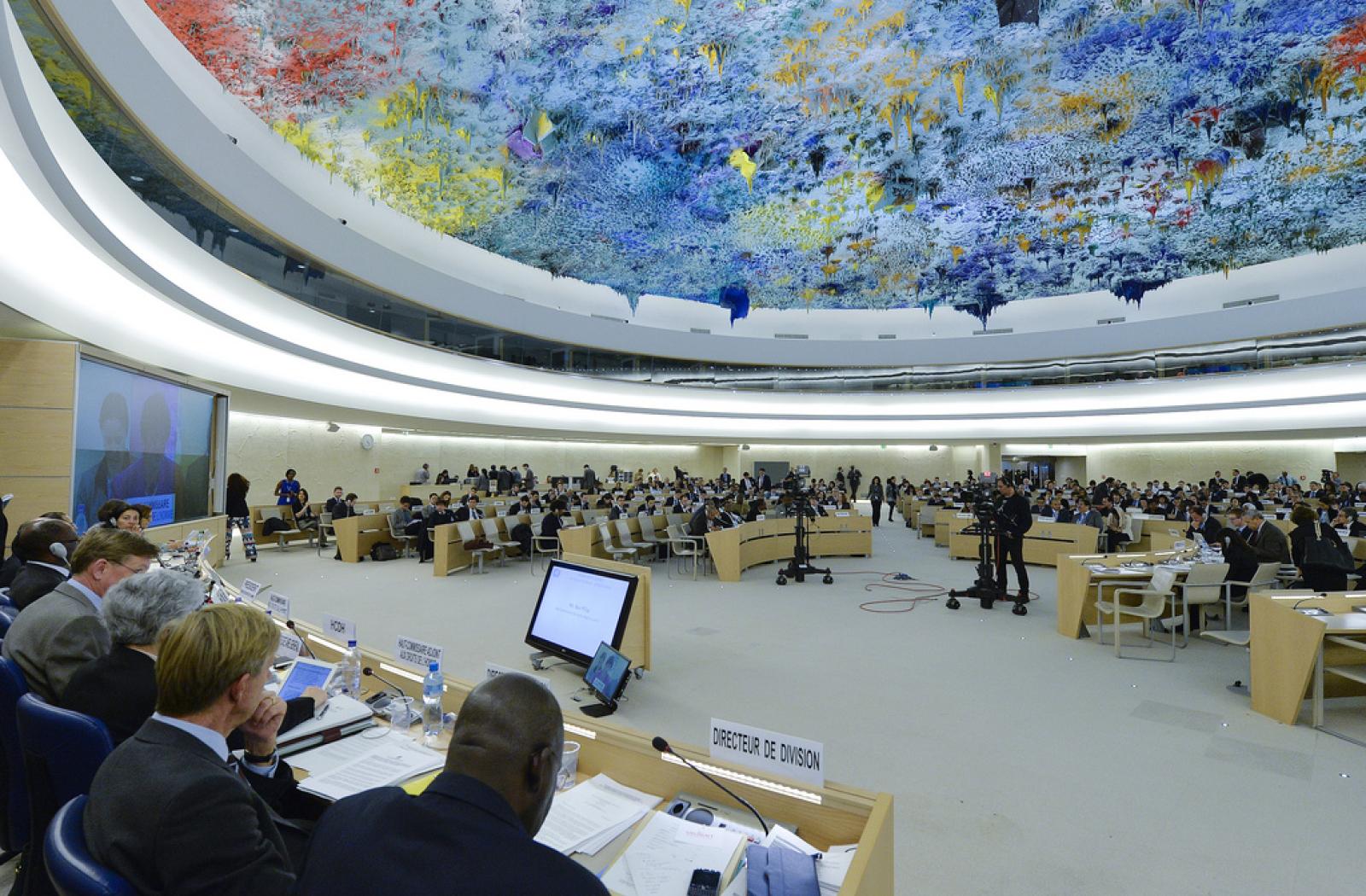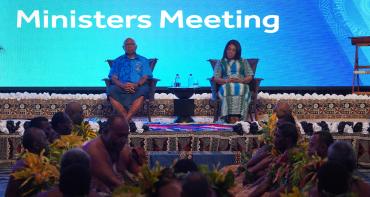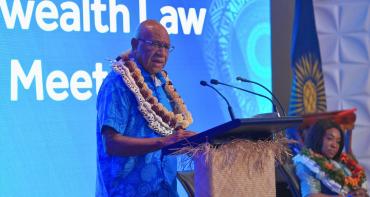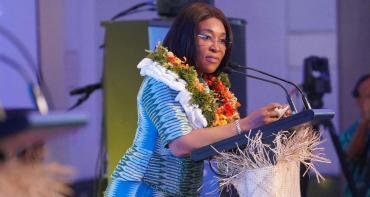Kamalesh Sharma addressed the High Level Segment of the UN Human Rights Council's 25th Regular Session in Geneva on 6 March 2014.

Full transcript of speech as delivered:
Mr President,
Deputy High Commissioner,
Madame Pillay,
Excellencies, Distinguished Delegates, Ladies and Gentlemen
It is an honour to address the Human Rights Council on behalf of the Commonwealth today and to inform it of priority areas where the Commonwealth has continued to seek to contribute to the advancement of the realisation of human rights, both in international fora and on the ground.
We congratulate the Members of the Council that were elected in November 2013. Nine Commonwealth countries are currently Members of the Council. I also wish to thank the High Commissioner for Human Rights, Navi Pillay, for the continued collaboration between her Office and the Commonwealth Secretariat in the joint delivery of technical assistance to our member states.
Mr President,
A number of Commonwealth commitments have been taken forward since I addressed the Council in February last year. The Commonwealth Charter has been disseminated widely across our 53 member states, and has grown in visibility as our key reference point. It consolidates the values and goals which unite the Commonwealth in regard to human rights, tolerance, respect and understanding, democracy, rule of law, sustainable development and the protection of the environment, access to health, education, food and shelter, and gender equality. It particularly recognises the need of small states, the importance of young people, and the role of civil society in the Commonwealth.
Our Heads met in Sri Lanka in November 2013 and have collectively urged Commonwealth members to accelerate efforts towards the ratification of all major international human rights instruments and to support the establishment and strengthening of National Human Rights Institutions in compliance with the Paris Principles.
Mr President,
The Commonwealth is committed to equality and respect for the protection and promotion of civil, political, economic, social and cultural rights, including the right to development, for all without discrimination on any grounds. We attach great value to the diversity and the richness of our multiple identities as individuals. As I have said, with regard to discrimination on the grounds of sexual orientation and gender identity, the responsibility for mutually respectful and constructive national debate is one shared by all. This includes parliaments, governments, national human rights institutions and human rights defenders. Judiciaries also continue to have a vital role in interpreting and applying national constitutional provisions, and consonance of national laws with international obligations. Universal Periodic Review recommendations have been accepted by a number of our member states in this regard. We continue to offer technical support for practical change as requested.
In relation to freedom of expression I note the resolution of the Council to make media professionals and journalists the focus group of the third phase of the World Programme for Human Rights Education for 2015-2019 with a special emphasis on training in equality and non-discrimination. I trust our members will actively participate in the development of the related Plan of Action. For our part, we are to examine how the Commonwealth Media Development Fund can be renewed in its purpose to build the capacity of a free and responsible media.
The Commonwealth Charter recognises the important role that civil society plays in supporting Commonwealth values and principles, including freedom of association and peaceful assembly, and in achieving development goals. The panel discussion next week on civil society space is a welcome opportunity to exchange views on challenges and good practices in creating and maintaining a safe and enabling environment for its promotion and protection.
Gender equality and women’s empowerment are recognised as basic human rights and essential components of human development. With respect to the girl child, a high-level Roundtable on early and forced marriage was convened by Commonwealth partners last year. The proceedings have been submitted to the Office of the High Commissioner as a contribution to the report that will guide the panel discussion on this issue during the June session of this Council. We trust that our contribution offers added value.
In May 2013, our member governments approved a new Commonwealth Secretariat Strategic Plan for the next four years. The Plan reflects the shared priorities of our member governments. In the area of democracy, it seeks to achieve greater adherence to Commonwealth political values including human rights, and more effective, efficient and equitable public governance with respect to public institutions.
The Plan also reflects our members’ shared intention that we should strengthen the capacities of governments and institutions to participate in the Universal Periodic Review mechanism. Our work has a focus on preparation for the review, post-review activities, and supporting member states with the sustainable and effective implementation of accepted recommendations. In each of the past five years we have convened regional and pan-Commonwealth seminars on UPR follow-up and implementation. Participants have included NHRIs and ombudsmen, parliamentarians, and representatives of government and civil society.
We continue to support the establishment, strengthening and operationalisation of National Human Rights Institutions. In regard to strengthening of these institutions, our work is focused on improving their functional independence and authority. When we assist with their establishment we focus on their legislative frameworks and public legitimacy.
Our Human Rights Unit has also collaborated with partners, including the Commonwealth Parliamentary Association and the Office of the High Commissioner for Human Rights, in a series of regional seminars on the role of parliamentarians in the promotion and protection of human rights. A first seminar was convened in Trinidad and Tobago last year, leading to the establishment of the Commonwealth Caribbean Parliamentary Human Rights Group. The regional seminar for Africa will take place in Seychelles later this month, and we hope to convene the Asia seminar in October.
The Commonwealth Office in Geneva continues to provide office space for diplomatic missions of small states and regional organisations representing small states. It is also a business centre for visiting small states delegations. Two human rights experts are based in the Office. They provide advisory services and technical assistance so that small states can participate more effectively in the discourse and decision-making processes that are taking place through the work of the human rights mechanisms here in Geneva, especially also support for the UPR process.
Mr President,
I wish to highlight key areas of Commonwealth co-operation with the Council and its mechanisms, and opportunities for our continued constructive and active engagement in their work.
In 2013, four additional Commonwealth members extended a standing invitation to the thematic special procedures of the Council. Last year also, the Commonwealth Roundtables on Reconciliation and on Early and Forced Marriage convened in London, benefited respectively from the wisdom of the Special Rapporteurs on the Promotion of Truth, Justice, Reparation and the Guarantees of Non-Recurrence, and on Violence against Women, its causes and consequences.
In May 2014, we will have reached the mid-term of the second cycle of the UPR. However, it is still, indeed, a new mechanism. States under review, as much as those participating in the review of their peers, bear a shared responsibility in ensuring that their engagement contributes to the preservation of the universality and the strengthening of the credibility and of the efficiency of the mechanism. To that aim, we encourage Commonwealth members to champion the generalisation of the good practices – these being the submission of voluntary mid-term reports to the Council on the status of implementation of UPR recommendations, and the formulation of a limited number of recommendations that are precise, constructive and practical.
Mr President,
In the wake of the Global Launch of 2014 as the International Year of Small Islands and Developing States in New York, last week, we are planning to host a High Level event in the margins of the next session of the Council in June. The objective will be to assess the achievements, remaining challenges and the way forward in order to ensure the universality of opportunities for the engagement and contribution of all our member states in the human rights discourse and decision making processes in Geneva, with particular focus on small states.
In conclusion, Mr President,
I would like again to pay tribute to that titan of our age, a man of the Commonwealth who touched the world and embodied reconciliation, Nelson Mandela.
Madiba said: “The Commonwealth makes the world safe for diversity”. The important consideration is to create and promote an environment of open-mindedness and goodwill, where incremental and enlightened steps of progress on human rights can be achieved.
The Commonwealth stands in partnership with the United Nations Human Rights Council.
I thank you.



